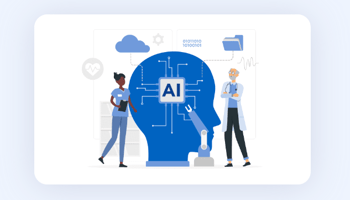In today's competitive digital landscape, staying ahead of the curve in app development is crucial...
The Ultimate Guide to Bespoke Application Development
Introduction
In today's fast-paced digital landscape, businesses are constantly seeking innovative solutions to stay ahead of the curve. One such solution gaining traction is bespoke application development. Tailored precisely to meet specific business needs, bespoke apps offer unparalleled flexibility and functionality. In this comprehensive guide, we'll delve into the intricacies of bespoke application development and explore how it can empower your business to thrive in a competitive environment.
Understanding Bespoke Apps
Bespoke application development involves the creation of custom software tailored to address the unique requirements of a particular business or industry. Unlike off-the-shelf solutions, which offer a one-size-fits-all approach, bespoke apps are meticulously crafted to align with the client's objectives, processes, and workflows. This tailored approach ensures optimal performance and user satisfaction, setting bespoke apps apart in a crowded marketplace.
Benefits of Bespoke Solutions
The advantages of bespoke application development are manifold. By investing in custom software, businesses can unlock a host of benefits, including:
- Enhanced Efficiency: Bespoke apps streamline processes and automate repetitive tasks, allowing employees to focus on value-added activities.
- Scalability: Tailored solutions can scale seamlessly with your business, accommodating growth and evolving requirements without the need for costly overhauls.
- Competitive Edge: Custom software gives businesses a competitive edge by enabling them to differentiate their offerings and deliver unique value to customers.
- Data Security: With bespoke apps, businesses have full control over data security measures, mitigating the risk of breaches and ensuring compliance with regulatory standards.
Key Considerations
Before embarking on bespoke application development, it's essential to consider several key factors:
- Business Objectives: Clearly define your business objectives and identify the specific challenges that bespoke software will address.
- Budget and Resources: Assess your budgetary constraints and available resources to determine the feasibility of custom development.
- User Requirements: Gather feedback from end-users to ensure that the bespoke app meets their needs and enhances their user experience.
- Long-term Maintenance: Plan for ongoing maintenance and support to keep your bespoke app running smoothly and up-to-date.
Process of Development
The development of bespoke applications typically follows a structured process, including:
- Discovery Phase: Collaborate with stakeholders to gather requirements, define goals, and outline project scope.
- Design and Prototyping: Create wireframes and prototypes to visualize the app's layout, functionality, and user interface.
- Development: Write code, integrate features, and perform rigorous testing to ensure the app meets quality standards.
- Deployment: Roll out the app to users, monitor performance, and collect feedback for further refinement.
- Maintenance and Support: Provide ongoing maintenance, updates, and technical support to address issues and enhance functionality.
Technologies Used
Bespoke application development leverages a wide range of technologies to deliver cutting-edge solutions, including:
- Programming Languages: Java, Python, C#, and JavaScript are among the most commonly used languages for bespoke app development.
- Frameworks and Libraries: Frameworks like Angular, React, and Vue.js, along with libraries such as jQuery and Bootstrap, expedite the development process and enhance functionality.
- Database Management Systems: SQL and NoSQL databases like MySQL, PostgreSQL, MongoDB, and Firebase are utilized to store and retrieve data efficiently.
- Cloud Computing: Platforms like AWS, Azure, and Google Cloud provide scalable infrastructure and services for hosting bespoke applications.
Case Studies
To illustrate the transformative power of bespoke application development, let's explore some real-world examples:
- E-commerce Optimization: A leading online retailer implemented a bespoke inventory management system, reducing order processing times by 50% and improving customer satisfaction.
- Healthcare Innovation: A healthcare provider developed a custom electronic medical records (EMR) system, enhancing data accuracy, patient care, and regulatory compliance.
- Financial Services: A fintech startup built a bespoke mobile banking app, offering personalized financial insights and transactional capabilities tailored to individual user preferences.
Challenges and Solutions
While bespoke application development offers numerous benefits, it also presents certain challenges, including:
- Cost Overruns: Mitigate cost overruns by conducting thorough requirements analysis and adopting agile development methodologies to accommodate changing priorities.
- Integration Complexity: Simplify integration with existing systems by leveraging APIs, microservices architecture, and interoperability standards.
- Resource Constraints: Address resource constraints by outsourcing non-core activities, partnering with experienced development firms, or leveraging low-code development platforms.
FAQs
1. What is bespoke application development? Bespoke application development involves the creation of custom software tailored to meet the specific needs of a particular business or industry.
2. How does bespoke development differ from off-the-shelf solutions? Unlike off-the-shelf solutions, which offer a generic approach, bespoke apps are customized to align with the client's unique requirements and workflows.
3. What are the key benefits of bespoke solutions? Bespoke solutions offer enhanced efficiency, scalability, competitive edge, and data security, among other advantages.
4. What factors should businesses consider before opting for bespoke development? Businesses should consider factors such as their objectives, budget, user requirements, and long-term maintenance needs before embarking on bespoke development.
5. What technologies are commonly used in bespoke application development? Bespoke application development utilizes programming languages, frameworks, databases, and cloud computing platforms to deliver tailored solutions.
6. What are some common challenges in bespoke app development? Challenges in bespoke app development include cost overruns, integration complexity, and resource constraints, which can be addressed through careful planning and strategic decision-making.
Conclusion
In conclusion, bespoke application development offers unparalleled opportunities for businesses to innovate, differentiate, and thrive in today's dynamic marketplace. By leveraging custom software tailored to their unique needs, businesses can enhance efficiency, scalability, and competitiveness while delivering exceptional value to customers. With careful planning, strategic execution, and ongoing support, bespoke apps can serve as powerful tools for driving growth, innovation, and success.


